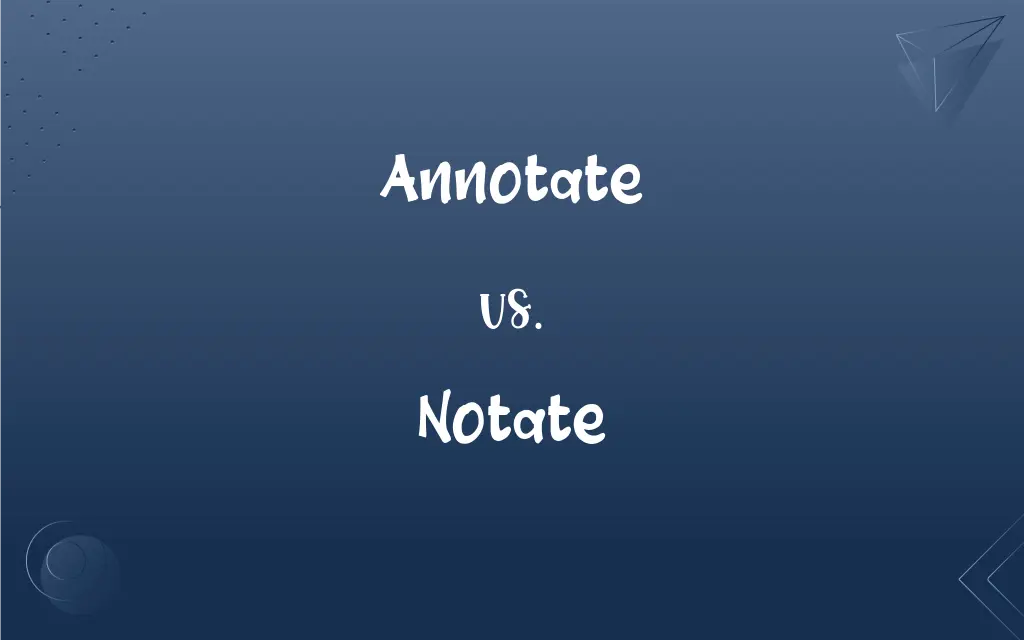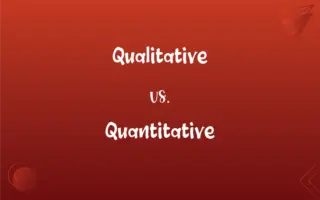Annotate vs. Notate: What's the Difference?
Edited by Aimie Carlson || By Janet White || Published on January 8, 2024
Annotate refers to add notes or comments to a text or diagram for explanation. Notate refers to write down information, especially using symbols or a formal system.

Key Differences
Annotate involves adding explanatory notes or comments to a text or diagram, often to provide more information or clarify meaning. Notate, however, refers to the act of recording information, usually through a structured system or using specific symbols.
When you annotate a book, you're adding insights, explanations, or critical comments, usually in the margins. Notate, in contrast, could mean writing down music using musical notation, or recording data in a specific format.
Annotate is commonly used in academic and literary contexts, where a deeper understanding of the text is desired. Notate is more prevalent in fields like music, mathematics, or data recording, where specific symbols convey precise information.
To annotate is to engage with the content, often adding personal insights or interpretations. Notate is typically more objective, focusing on the accurate recording of information rather than interpretation.
Annotate often requires a higher level of engagement with the material, as it involves forming and expressing thoughts about it. Notate is more about the method of recording and less about interpretation or personal insight.
ADVERTISEMENT
Comparison Chart
Primary Function
Adding explanatory notes or comments
Writing down information using symbols/system
Common Contexts
Academic, literary texts
Music, mathematics, data recording
Focus
Explanation, interpretation, engagement
Accurate recording, symbol usage
Objective
Enhance understanding, provide insight
Document information precisely
Engagement Level
High, involves personal insights
Objective, focused on method of recording
ADVERTISEMENT
Annotate and Notate Definitions
Annotate
To add remarks or observations to a document.
The professor annotated the thesis with helpful comments.
Notate
To write down information systematically.
The researcher notated the experiment's results in a log.
Annotate
To offer an explanation or personal view on a text.
The critic annotated the play with her own interpretations.
Notate
To use symbols to represent information.
The composer notated the melody using standard musical symbols.
Annotate
To make something clearer by providing detailed notes.
He annotated the complex chart to elucidate its meaning.
Notate
To represent information in a specific code or format.
The programmer notated the algorithm in a structured code.
Annotate
To add explanatory notes to clarify or expand on a text.
She annotated the poem to help students understand its themes.
Notate
To convert spoken words or ideas into written form.
She notated the lecture verbatim.
Annotate
To make something more understandable through additional notes.
Annotations in the margins of the book helped clarify difficult passages.
Notate
To formally write down details or observations.
He notated the meeting minutes for official records.
Annotate
To furnish (a literary work) with critical commentary or explanatory notes; gloss.
Notate
To put into notation.
Annotate
To gloss a text.
Notate
To mark with spots or lines, which are often colored.
Annotate
(transitive) To add annotation to.
Notate
To add notes to; to annotate
Annotate
To explain or criticize by notes; as, to annotate the works of Bacon.
Notate
To create notation (e.g. music or mathematics); to record/put down in the form of notation
Annotate
To make notes or comments; - with on or upon.
Notate
(botany) Marked with coloured spots or lines.
Annotate
Add explanatory notes to or supply with critical comments;
The scholar annotated the early edition of a famous novel
Notate
Marked with spots or lines, which are often colored.
Annotate
Provide interlinear explanations for words or phrases;
He annotated on what his teacher had written
Notate
Put into notation, as of music or choreography;
Nowadays, you can notate an entire ballet; in the old days, the steps had to be memorized
FAQs
Is notating important in music?
Yes, it's essential for recording and communicating musical compositions.
Can notate be used for everyday notes?
Yes, though it often implies a more structured or symbolic form of note-taking.
Is annotating the same as summarizing?
No, annotating involves adding detailed notes, while summarizing is condensing the main ideas.
Can annotations be made digitally?
Absolutely, digital tools allow for annotations on electronic documents.
Do annotations always have to be written?
Primarily, yes, though they can also include symbols or other markings.
Can I notate my own shorthand system?
Yes, as long as it's a consistent system that you understand.
Is annotating useful for studying?
Yes, it helps in better understanding and remembering the material.
Can I annotate a film or a piece of art?
Yes, through notes or comments about your interpretations or observations.
Is notating used in programming?
Yes, especially for writing code or documenting processes.
Should annotations be brief?
They should be concise yet informative enough to add value.
Are annotations subjective?
They can be, as they often include personal insights or interpretations.
Is notating a skill that can be learned?
Yes, it can be improved with practice, especially in specialized fields.
Can annotations alter the meaning of a text?
They shouldn't alter it, but rather enhance understanding or provide context.
Can anyone learn to annotate effectively?
Yes, with practice and understanding of the material being annotated.
Does notate require knowledge of specific symbols?
Often, especially in contexts like music or scientific data.
Is musical notation the only form of notating?
No, there are other forms, like mathematical notation or coding.
Does notating help in data analysis?
Yes, as it provides a structured way to record and interpret data.
Can notate be used in legal documents?
Yes, for recording specific information in a structured manner.
Are annotations always helpful?
Generally, yes, but they should be clear and relevant to be effective.
Can notate be used in scientific research?
Absolutely, for accurately recording experimental data and observations.
About Author
Written by
Janet WhiteJanet White has been an esteemed writer and blogger for Difference Wiki. Holding a Master's degree in Science and Medical Journalism from the prestigious Boston University, she has consistently demonstrated her expertise and passion for her field. When she's not immersed in her work, Janet relishes her time exercising, delving into a good book, and cherishing moments with friends and family.
Edited by
Aimie CarlsonAimie Carlson, holding a master's degree in English literature, is a fervent English language enthusiast. She lends her writing talents to Difference Wiki, a prominent website that specializes in comparisons, offering readers insightful analyses that both captivate and inform.




































































